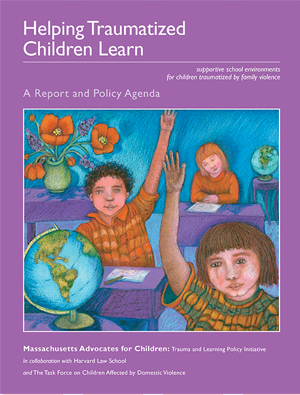 History and Background
History and Background
Mission
The Trauma and Learning Policy Initiative’s (TLPI) mission is to ensure that all students, including those impacted by trauma, succeed at their highest levels in school and in life. We define trauma to include harms stemming from individual adverse experiences as well as from structural inequities like racism. To accomplish this mission, TLPI engages in a host of advocacy strategies including: providing support to schools to become trauma sensitive environments; research and report writing; legislative and administrative advocacy for laws, regulations and policies that support schools to develop trauma-sensitive environments; coalition building; outreach and education; and limited individual case representation in special education where a child’s traumatic experiences are interfacing with his or her disabilities.
Genesis
Our work has its roots in the school exclusion crisis that arose in Massachusetts in the mid-1990’s. Massachusetts Advocates for Children (MAC) noticed a pattern of violence in the lives of many of the children who had been expelled or suspended from school. Working together with parents and experts across the disciplines of education, psychology, law, and neurobiology, MAC organized the Task Force on Children Affected by Domestic Violence, which produced five working papers on the impact of domestic violence on education, family law, and other matters. These papers laid the foundation for later research and a growing recognition that traumatic experiences were impacting children at school in specific ways, including their ability to perform academically; manage their behavior, emotions and attention; and develop positive relationships with adults and peers. Building on the recognition generated by the Task Force’s work, MAC successfully advocated at the Massachusetts legislature for the creation of the Safe and Supportive Learning Environments grant program (MGL c. 69, sec. 1N (b)) that gave small amounts of money to school to experiment with trauma sensitive approaches.
In 2000, MAC joined in partnership with Lesley University’s Center for Special Education to hold the first ever conference on the impact of trauma on learning. From that point on the work on trauma’s impact on learning at school gained momentum as MAC worked with an interdisciplinary group of psychologists, educators, and attorneys to draft what would later be published as Helping Traumatized Children Learn (HTCL). This publication introduced the Flexible Framework—an organizational tool for creating trauma sensitive schools—developed by MAC in collaboration with those schools that had received funding from the legislature.
In 2004, MAC entered into a formal partnership with Harvard Law School called the Trauma and Learning Policy Initiative (TLPI). In addition to advocacy at the state and national levels, the Education Law Clinic operated by TLPI teaches Harvard law students advocacy and litigation skills on behalf of this population of vulnerable children.
Since the publication of HTCL in 2005, over 95,000 copies have been distributed. Schools in Massachusetts and across the country have used the Flexible Framework to create trauma sensitive environments structured to help all children learn. The second volume of HTCL, Creating and Advocating for Trauma-Sensitive Schools, shares the experiences of these trauma sensitive educators with other schools that are considering addressing the impact of trauma on learning.
Ongoing Activities
- Helping schools create trauma-sensitive environments;
- Advocating for laws, policies and funding streams that will enable schools to create trauma sensitive learning environments
- Improving trauma sensitive approaches to meeting the needs of individual children at school in both regular and special education;
- Engaging in a public education campaign to teach policymakers, educators, administrators, health and mental health providers and parents about the impact of trauma on learning and the need for trauma sensitive schools
For further background about TLPI, please read the Harvard Law Bulletin cover-story from the Fall 2014 issue.